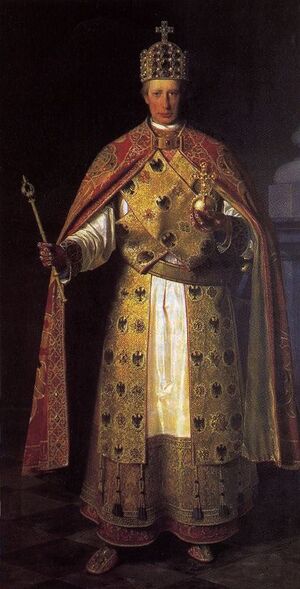Many thanks to our Patrons who cover ~2/3 of our hosting bill. Please join them if you can.
1806
Jump to navigation
Jump to search
1796 < 1797 < 1798 < 1799 < 1800 < 1801 < 1802 <1803 < 1804 < 1805 < 1806 > 1807 > 1808 > 1809 > 1810 > 1811 > 1812 > 1813 > 1814 > 1815 > 1816
 After a 1000 years in existence, the Holy Roman Empire is dissolved by now Austrian Emperor Francis II |
Events
January–March
- January 1
- The French Republican Calendar is abolished.
- The Kingdom of Bavaria is established by Napoleon.
- January 18 – The Dutch Cape Colony capitulates to British forces, the origin of its status as a colony within the British Empire.
- January 23 – Grenville succeeds his cousin William Pitt the Younger as wartime Prime Minister of the United Kingdom upon Pitt's death this day amidst worsening health, caused by the stresses of the Napoleonic Wars.
- May 30 – Future President of the United States Andrew Jackson fights his second duel, killing a man who had accused Jackson's wife of bigamy.
- June 5 – Louis Bonaparte is appointed as King of Holland by his brother, Emperor Napoleon, replacing the Batavian Republic.
- July 10 – Vellore Mutiny: Indian sepoys mutiny against the East India Company, for the first time.
- July 12 – Sixteen German Imperial States leave the Holy Roman Empire and form the Confederation of the Rhine; Liechtenstein is given full sovereignty, leading to the collapse of the Empire after 844 years.
- July 23 – British invasions of the River Plate: A British expeditionary force of 1,700 men lands on the left bank of the Río de la Plata and invades Buenos Aires.
- August 6 – Francis II, the last Holy Roman Emperor, abdicates, thus ending the Holy Roman Empire after about a millennium.
- September 25 – Prussia issues an ultimatum to Paris, threatening war if France does not halt marching its troops through Prussian territory to reach Austria; the message does not reach Napoleon Bonaparte until October 7, and he responds by attacking Prussia.[1]
- October 8 – Napoleon responds to the September 25 ultimatum from Prussia, and begins the War of the Fourth Coalition; Prussia is joined by Saxony and other minor German states.
- October 17 – Emperor Jacques I of Haiti (Jean-Jacques Dessalines) is assassinated at the Pont-Rouge, Haiti, and Alexandre Pétion becomes first President of the Republic of Haiti.
- October 24 – French forces enter Berlin.
- October 30 – Capitulation of Stettin: Believing themselves massively outnumbered, the 5,300-man garrison at Stettin in Prussia surrenders to a much smaller French force without a fight.
- November 21 – Napoleon declares the Continental Blockade against the British, blocking the import of British manufactured goods to the rest of Europe.[2]
- November 24 – The last major Prussian field force, under Gebhard Leberecht von Blücher, surrenders to the French near Lübeck. Frederick William III has by this time fled to Russia.
- November 28 – French troops enter Warsaw.
Date unknown
- East India Company College established in Hertfordshire, England, to train colonial administrators.
- Annual British iron production reaches 260,000 tons.
A New Group
| Group | Image | Description |
|---|---|---|
| Haileybury |  | "The people who run the world go to Hailesbury" |
A Death
| Title | Born | Died | Summary | Description |
|---|---|---|---|---|
| William Pitt the Younger | 28 May 1759 | 23 January 1806 | Politician | Twice UK PM |
A Birth
| Title | Born | Place of birth | Died | Summary | Description |
|---|---|---|---|---|---|
| John Stuart Mill | 20 May 1806 | Islington London UK | 7 May 1873 | Philosopher Economist Civil servant | Philosopher |
Many thanks to our Patrons who cover ~2/3 of our hosting bill. Please join them if you can.
References
- ↑ F. Loraine Petre, Napoleon's Conquest of Prussia - 1806 (John Lane Company, 1907) pxv
- ↑ "Napoleon's Continental Blockade— An Effective Substitute to Naval Weakness?" by Silvia Marzagali, in Naval Blockades and Seapower: Strategies and Counter-Strategies, 1805-2005 ed. by Bruce A. Elleman and S.C.M. Paine (Routledge, 2007) p25